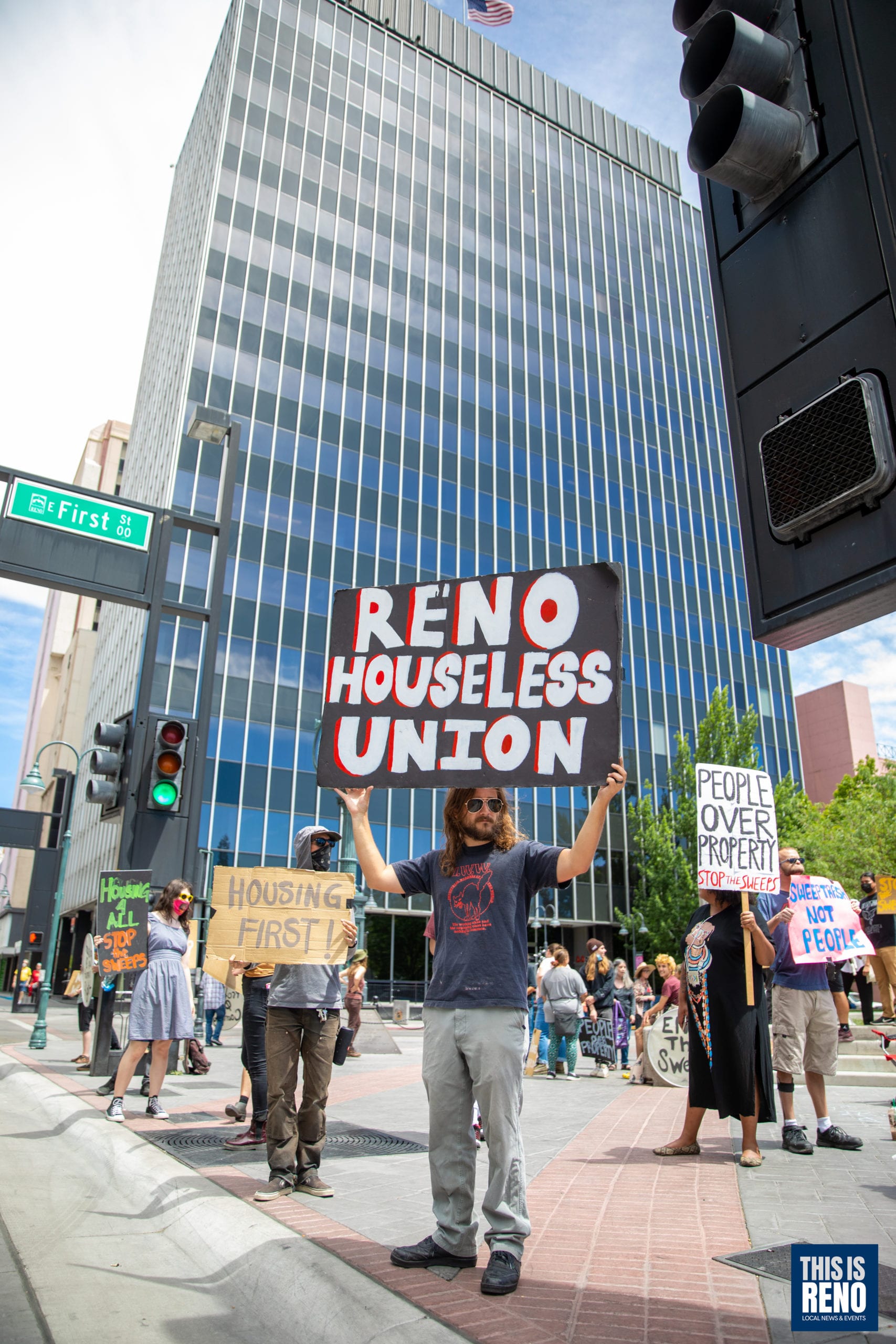Submitted by Jeff Mitchell
Recently, local officials (led by city manager Doug Thornley) have intensified “sweeps” of homeless encampments around the Reno/Sparks area. These sweeps involve the issuance of official eviction notices. For those who are unable or unwilling to move, bulldozers are sent by the city with police escorts to confiscate the possessions of the area’s most vulnerable people.

These sweeps are fueled by public pressure on local officials to “do something about the homelessness problem,” accompanied by the common idea that people experiencing homelessness cause crime.
To their credit, local activists have brought sustained attention to this issue through protests, advocacy and mutual aid initiatives, all of which have helped to temporarily relieve suffering and highlight the human toll taken on people experiencing homelessness. A common slogan amongst these activists is “Where are they supposed to go?” The answer from local officials is: the newly built Nevada Cares Campus, a warehousing facility that is a short term stopgap to get people off the streets.
However, we must ask: What is the goal here? If we want to reduce the number of people experiencing homelessness, and thereby minimize human suffering then, will the Cares Campus do the job? Also, are the police the right tool to use to get services to people?
This situation revolves around three key assumptions:
- The police are an effective tool for reducing crime and providing outreach.
- The Cares Campus will be effective in reducing homelessness.
- Based on these two assumptions, this is where the Reno and Sparks city and Washoe county governments should invest their resources.
So, what do the experts say?
Policing does not reduce crime.
This is a common assumption and a contentious topic. However, according to a summary of the criminology literature, scholars find no consistent correlation between crime rates and levels of police. This includes 62 studies that have analyzed the police force size-crime relationship across the US from 1968-2013.
Still, the country has experienced a substantial drop in crime over the decades. So what explains it? According to a study published in the flagship sociology journal in 2017: community organizations. They estimate that on average, every 10 additional organizations focusing on crime and community life in a city leads to a 9% reduction in the murder rate, a 6% reduction in the violent crime rate, and a 4% reduction in the property crime rate.
If police can’t fulfill their basic societal function, to reduce crime, then why do city officials expect them to be an effective tool for this criminalized social problem?
Short term solutions don’t work
UCLA economist Elior Cohen published a recent study that analyzed a random selection of people that received different homelessness interventions in Los Angeles, and the likelihood that they return to seek services afterward. For people who received temporary housing assistance through emergency shelters, like the Cares Campus, he found “the estimated impact among individuals in temporary housing programs (e.g., emergency shelters) is not different from receiving no housing assistance at all.” In other words, the short term solution didn’t work.

Instead, Cohen found that those who received long term housing assistance (longer than six months), were about half as likely to return to homelessness (20% versus 40%). Furthermore, “the housing programs reduce crime, increase employment, and improve health, while not increasing reliance on social benefits. A simple cost-benefit analysis implies that up to 80% of housing and program costs are offset by these potential benefits in the first 18 months alone.”
This is not surprising given the sociological/criminological research that points to community programs and organizations, not police, as the driver of crime reduction. From a strict cost-benefit point of view, there don’t seem to be many better ways for local officials to allocate resources, which leads us to the final point.
Stop the sweeps, divert funds from the police to long-term housing
City and county governments have a finite amount of resources. And while talking about budgets is boring, it is necessary since they are one of the biggest ways local elected officials make policy choices.
This year the police take up 33% of total expenditures in Reno and 41% in Sparks. This is an enormous amount of money for agencies that are generally unable to fulfill their primary function of reducing crime. At some point, cities including Reno and Sparks, need to begin to ask themselves whether these funds could be better spent elsewhere.

If our goal is to reduce the suffering of our neighbors experiencing homelessness, then we need to take an honest look at whether the tools we are using to achieve that goal are adequate. The Cares Campus, and the police sweeps are not the right tools for the job. Stop the sweeps. Instead, change the budget to robustly invest in a long term housing assistance program. It is backed by research, it will save lives, reduce crime, and it is morally the right thing to do.
Jeff Mitchell is Reno native, a sociologist, and post-doctoral research fellow at Umeå University in Sweden studying prejudice, youth, and the police using quantitative methods.
Submitted opinions do not necessarily reflect the views of This Is Reno. Have something to say? Submit an opinion article or letter to the editor here.

